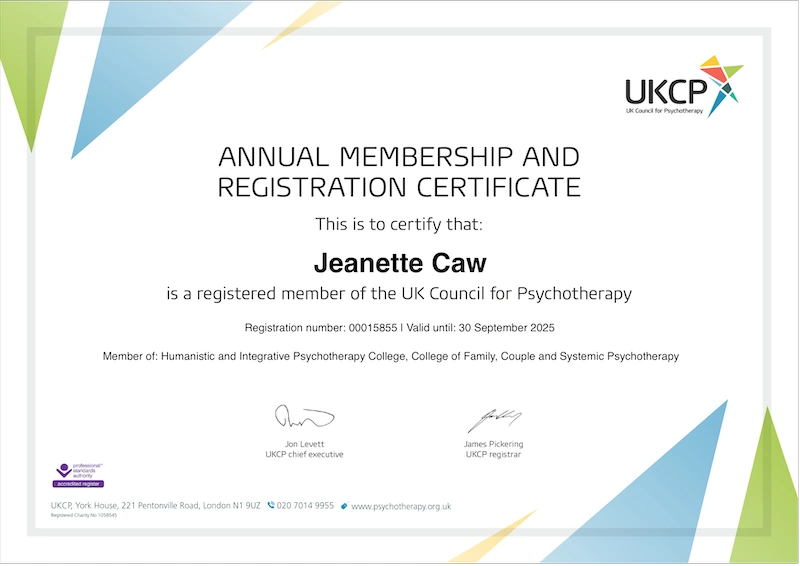Bereavement
Help with Bereavement and Loss
Losing someone or something you love can be a deeply painful experience. Feeling sad and like the pain will never end are normal responses to bereavement and loss. They comprise the process of grief or grieving. Grief is a natural response to loss. Typically, the more significant the loss and the stronger the attachment to that person/thing, the greater the experience of grief will be.
Usually we associate grief with the death of a loved one. Whilst this is invariably the most intense type of grief, any type of loss can lead to a grieving response, including:
• Divorce or the end of a relationship
• Loss of health
• Redundancy
• Miscarriage
• Loss of financial stability
• Retirement
• Loss of a pet
• Serious illness in a family member
• Loss of a friendship
• Loss of safety after a trauma
• Selling the family home
• Adultery
• A child with a learning disability or significant health problems
Grieving is a highly personal and individual process, there is no ‘right’ way to grieve. How you grieve is likely to be affected by the nature of the loss, your personality, your life experience, and your coping style as well as by family/community/religious beliefs regarding grief. There is also no timetable for the grieving process to follow although more significant losses, like losing a close attachment figure, are likely to lead to longer periods of grief.
Stages of Grief
In 1969, a psychiatrist called Elisabeth Kubler-Ross, introduced a model for describing the stages of grief. This was in response to studying the feelings of people facing terminal illness. These stages are:
• Shock: Numbness, hard to accept that this has happened
• Denial: This can’t be happening to me
• Anger: Why is this happening? Who is to blame
• Bargaining: Looking for a way out or trying to negotiate an alternative
• Depression: I can’t go on with this sadness, it is too much
• Acceptance: Accepting of the loss, ready to integrate the loss into life going forward
For someone who is grieving, it is sometimes helpful to know that if they are experiencing these feelings, they are normal. However, not everyone experiences these stages. It is not true that you need to progress through these stages in order to resolve your feelings of loss. Even if you do experience some or all of these stages, you will not progress through them in a sequential manner and it is entirely normal to revisit earlier stages along the way.
Instead of thinking of stages of grief, it can be useful to think of grieving as a roller coaster, with highs and lows, ups and downs. Usually, the early stages are more difficult with the lows being deeper and longer. However, over time the difficult periods tend to lessen, becoming less intense and being briefer in duration.
When to seek Counselling and Psychotherapy:
It is important when grieving to access the support of other people and to make sure that you do not isolate yourself. Sharing your loss and sadness make these feelings easier to bear. Frequently, people find that friends and family, the support of a group or of a faith, are all they need to support them through bereavement. However, occasionally additional support may be needed. Sometimes, people feel that they do not want to burden their families and friends with their feelings or that they are aware that their nearest and dearest are unsure at how to best support them. Psychotherapy and counselling can also be helpful when the grief is complicated by other circumstances, for example, a difficult relationship that was never resolved; finding out information following the death that was not known before; renewed grief long after the initial loss due to re-stimulating events in current life as well as other reasons.
On occasion, a process of what is known as complicated grief can occur. Complicated grief leads to an experience of being stuck in an intense period of mourning. The signs of complicated grief include:
• Intense yearning and longing for your loved one
• Intrusive thoughts of the deceased
• Extreme anger and bitterness
• Feeling that life is empty and meaningless
• Imagining your loved one is still alive and searching for them in familiar places
It is time to seek help with grief if you experience some of the above or if you find yourself feeling
• Life isn’t worth living anymore
• You wish you had died too
• You are to blame
• Unable to function in your daily life
How Psychotherapy and Counselling can help:
Talking to an impartial, neutral but empathic and understanding person can help make sense of complicated emotions. Having feelings understood and normalised can itself be a healing process. Being able to express how you feel, especially if your emotions are confusing, conflicting or you think you ‘shouldn’t’ have them can help resolve them and lead to a state of integration and acceptance. It is difficult to predict how many sessions will be needed when working with grief and bereavement but often 6-8 sessions will be sufficient and enough for you to feel able to proceed with your life and manage your feelings on your own. Occasionally though, talking through the bereavement may lead to an awareness of other issues in your life which are unresolved and then a longer period of work may be needed.
If you would like to arrange an initial session or contact me about any of the other services mentioned in these pages
I practice within Sheffield from a venue in S7.


